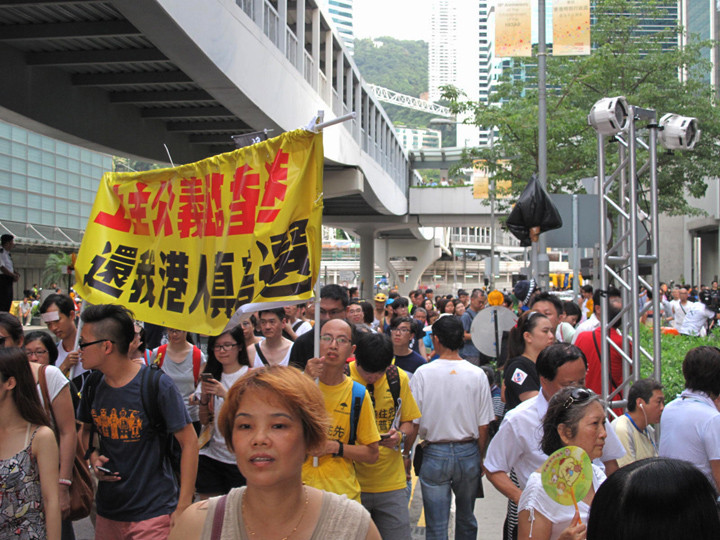Hong Kong July 1, 2015 is a place of varying opinions among its people concerning the way ahead. Which path to take, a pro-Beijing one that will curtail individual freedoms to an uncertain extent, but nothing that cannot be handled, or, that of opposition to the pro-Beijing administration under Chief Executive Leung Chun-ying that has only resulted in a stalemate in the various facets of development of Hong Kong, from political to economic.
This day there is the annual come-out-on-the-street protest and carry the banner for what you will – but largely framed as a voice-out for democracy rally. Starts 3pm from Victoria Park on Hong Kong island.
On this day too the RTHK news reports that The National People’s Congress Standing Committee has voted in support of a new national security law, which will be implemented with immediate effect. It highlighted Hong Kong and Macau’s obligations under the law, saying that the two Special Administrative Regions must fulfill their responsibilities.
While the new legislation prohibits acts such as treason, secession and subversion, as well as the theft of state secrets (of course), it also covers everything from food safety to religious activities, and from cyber security to activities in space. However, a spokesman later stressed it would not be applied to Hong Kong as it is not stated in the Basic Law annex.
There is an adage from Olde England that asked that when one law was brought in at least one should be stricken from the books, oh that was happening now! We are being stifled by laws and China has good experience to show that Legalism is very limited system. It’s to the Far Right of Trust.
The Book of Lord Shang relates: order with simplicity and disorder with complexity, teaching that in an orderly state, “laws abolish laws” and “words abolish words”. Stillness being attained and the creative purpose of law being accomplished, it goes unused.
On this special day for Hong Kong the July 1 march was born and it came out of that special moment in 2003, when opposition to the proposed Article 23 national security law grew so strong that the Civil Human Rights Front was formed to platform opposition views. This resulted in the organisation of the July 1 protests.
The 2003 march was a major event that continues to provide a reference point for the Hong Kong protest movements, whatever your ‘bag’ bring it along. Yet the Civil Human Rights Front has continued to organise the march, while themes vary by the year, they always pivot around human rights and calls for greater democracy.
Meanwhile, around the world this very same democracy term is being abused by those wanting to stay in power and by those wanting to undermine the powers-that-be, for hidden ends that have nothing at all to do with democratic participation into the general system and process of government, of managing a people and its economy and the ways and means of doing so.
Beijing sees democracy in its wide-ranging selection of people from all strata of Hong Kong society to make up its nomination committee; democrats of most persuasions in Hong Kong seem to have a single goal in sight – one-man-one-vote for electing into office the Chief Executive.
All of these groups would do well to question why they are wanting to follow in the steps of the old colonialists by having such supremo at the top of the heap.
Is a ‘leader’ needed or a co-ordinator and liaison between Hong Kong, the SAR executive officers and thereby the central government in far away Beijing. The CE could be simply a spokesperson, both up and down, at the beck and call of Hong Kongers.
It has been well attested that the way government is run in Hong Kong is like a corporate business body that has an agenda and will implement that agenda despite opposition from the people. This is seen in all major decisions from additional airport runways, to mass-burning waste incinerators, to non-recycling programmes where the public consultations turn out to be simple ‘what you need to know’ lectures at one-sided forums.
In mainland China itself there are social and green movements that have successfully changed things that example more democracy than can be found in Hong Kong, especially with so much wasted hot air between the different protagonists.
If Hong Kong is to be saved from itself it should get on with the job of sorting everything out and that means involvement in all the institutions, from unions to neighbourhood groups, to have as many voices – and feet – involved at all the levels and most important at the root level where each individual counts. This will be fulfilling Hong Kong’s responsibilities.
Note: Establishment Day, formally the Hong Kong Special Administrative Region Establishment Day is celebrated this day in Hong Kong and has been since 1997. The holiday commemorates the transfer of the sovereignty of Hong Kong from the United Kingdom to the People’s Republic of China and the establishment of the Hong Kong Special Administrative Region.










